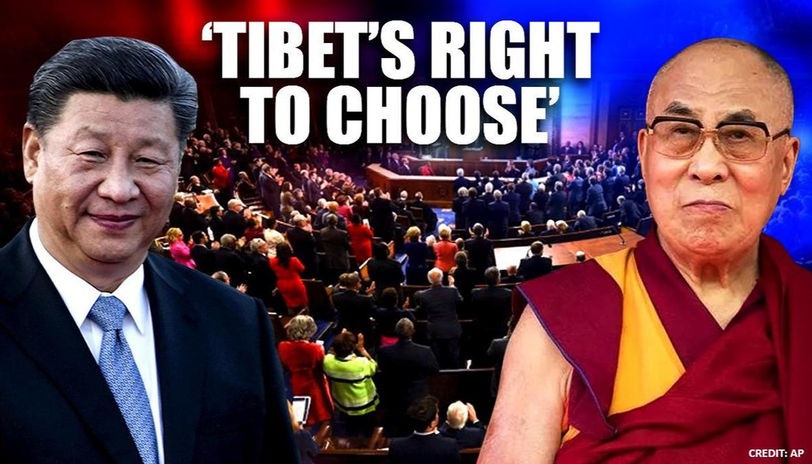China’s communist authorities appear to have reached the conclusion approximately 18 months ago that the time for selecting the reincarnation of the XIVth Dalai Lama is drawing near. Since then they have stepped up efforts to capture the hearts and minds of the Tibetan people and adapt Tibetan Buddhism to “socialism with Chinese characteristics”. China’s official media has recently begun to often refer to “Chinese Buddhism”! Blatant indication of the effort to project Buddhism as Chinese is the article authored by the Chinese Ambassador to India Sun Weidong and published in an Indian newspaper in November last year. The article claimed that “Buddhism was introduced into Tibet from the Tang Empire” completely ignoring that Padma Sambhava and numerous other sages had travelled from India to Tibet and China carrying Buddhist religious texts.
Beijing’s central objectives are to undermine the influence that the XIVth Dalai Lama wields over Tibetans inside China and around the world and ensure that they accept the reincarnation of the Dalai Lama who will be selected by the Chinese communist regime. This is essential for Beijing to legitimise and secure its hold over Tibet. The Dalai Lama has, meanwhile, declared he will live till he is at least 113 years old and made explicit that his reincarnation will not be found within the jurisdiction of an authoritarian regime and, specifically, China. He has, additionally, raised doubts as to whether he will be “reincarnated” or opt for the procedure that allows him to select an “emanation”. Beijing has since then insisted that the next Dalai Lama must be reincarnated!
An equally important objective for Beijing is dissipating the anti-Chinese, or more specifically the anti-Chinese Communist Party (CCP), sentiment among the Tibetan Buddhist monks and nuns. In addition to persuading them to adapt the teachings of Tibetan Buddhism to "socialism with Chinese characteristics", they are simultaneously being given "patriotic education" to make them loyal to the communist regime in Beijing. The efforts have accelerated over the past year and coincide with the CCP's effort to promote acceptance among Tibetans and Buddhists world-wide of Gyaltsen Norbu, appointed by the Chinese in 1995 as the legitimate Panchen Lama. The Chinese-appointed Panchen Lama’s initial brief visits to Tibet interspersed with long intervals have, since last year, yielded to him staying for extended periods in the Tibet Autonomous Region (TAR). More importantly, he has for the first time begun venturing outside Shigatse and travelling to other places and regions in TAR like the Labrang Tashikhyil monastery in the Labrang area of eastern Tibet (Amdo), Nyingchi opposite the Indian state of Arunachal Pradesh and Ngari (Ali), opposite India’s Ladakh. The aim is to have him accepted as the second highest-ranking religious personage in the 'gelug' school of Tibetan Buddhists and facilitate his assumption at the appropriate time of the traditional historical role as the reincarnate Dalai Lama's Tutor.
Other measures are also being implemented. Beijing has directed the Police Headquarters in TAR to launch a new propaganda campaign entitled ‘One million policemen into ten million homes’ ostensibly to maintain ‘zero distance’ between the police and the people. The year-long campaign, launched on January 14 and scheduled to end by December 2020, envisages grassroot civilian police units entering all aspects of a community, including pastoral areas, monasteries, nunneries, campuses, markets, construction sites, homes, and border areas to ‘mingle’ closely with the common people. Township police units have been asked to enter virtual WeChat groups. On receipt of these instructions policemen have started visiting families and giving them edible oil, rice, flour, vegetables, etc. This is in addition to the policy of deploying one Party cadre in each village in TAR.
Similarly, the TAR People Congress decided in late January this year to establish a ‘National Unity Affairs Office’ in TAR. This requires all levels of government, companies, community organisations, villages, schools, military groups and religious activity centres to work on ethnic unity and “integrate ethnic unity” into their culture. Monks and nuns have been asked to treat ‘national unity’ as their personal objective and contribute to “maintaining harmony and stability in the religious field.” The measures augment other efforts already underway to control monasteries and nunneries through “model patriotic” monks and a cadre of “monastic monks” who supervise and administer monasteries.
Threatening to upset China’s plans is the ‘Tibet Policy and Support Act’ passed by the US House of Representatives on January 28 with a landslide majority of 392-22 amending the Act of 2002. Since the Tibet issue has wide bipartisan support, the Bill is likely to soon be passed by the Senate and will then be forwarded for the U.S. President’s signature. The amended ‘Tibet Policy and Support Act’ is more direct in its support for the Dalai Lama and incorporates potential punitive measures.
Especially important are its recommendations that the Chinese authorities resume talks with the Dalai Lama or his representatives or democratically-elected leaders of the Tibetan community without preconditions; provision for sanctions against Chinese officials who interfere in the ‘reincarnation’ process of the next Dalai Lama; and visa sanctions, freezing of US assets of those sanctioned and suspension of business transactions between the Chinese officials and US citizens and companies. It additionally opposes any effort by Chinese authorities to identify, select, educate or install Tibetan Buddhist religious leaders, including any future Dalai Lama, in a manner inconsistent with the Tibetan Buddhist faith and community. It adds too that the US Administration should not authorize China to establish any additional consulate in the US till a US consulate is established in Lhasa. These new recommendations seek to pressure China into changing its policy on Tibet.
China’s consistent position has been that the negotiations are intended only to address the Dalai Lama’s personal concerns and are not with the Tibetan administration in exile. Talks have, therefore, been thus far restricted to between the Dalai Lama’s Envoys and representatives of the CCP Central Committee’s United Front Work Department (UFWD). It has consequently declined to entertain “democratically-elected leaders of the Tibetan community”. The reference to “without preconditions” points to the US Congress wanting to broaden the scope of discussions to include discussion of issues also in the post- XIVth Dalai Lama period.
The proposed sanctions give teeth to the Act. Though China’s official Global Times newspaper quoted Diao Daming, Associate Professor at China’s Renmin University, as saying this "long-arm jurisdiction" actually has a limited impact on Chinese officials, the newspaper ignored that many Chinese cadres travel to the U.S., have relatives residing abroad and children studying in U.S. colleges. They could all potentially be adversely impacted.
The visa sanctions have a precedent. In 2013, Spain's National Court had issued an arrest warrant against five former Chinese leaders, including former Chinese President Jiang Zemin, former Prime Minister Li Peng and Chinese President Hu Jintao on charges of “genocide” in Tibet. The case against them was brought by human rights groups under Spain’s ‘recognition of universal jurisdiction’ -- the principle that crimes against humanity can be prosecuted across borders. Before the subject came up for trial Spain's National Court, reportedly under pressure from China in 2014, introduced changes in Spanish Law. The amendment restricted Spanish judges to only investigate crimes of genocide and crimes against humanity if those indicted were Spanish citizens or foreigners who had their habitual residence in Spain at the time when the crimes were committed.
The US Congress also authorised grants from 2021 till 2025 totalling over US$ 9 million to the Tibetan administration in exile, Tibetan communities in India, Nepal and the TAR as well as to Radio Free Asia and Voice of America. While the amount is the same as last year it confirms continuing US support to the Tibetans and this financial support will cause discomfort to the Chinese authorities.
The Bill passed by the US House of Representatives bolsters the Dalai Lama’s negotiating position with the Chinese. Once signed by the U.S. President it will give an additional lever to the U.S. Interesting around this time is the 16-point Joint Press Statement issued at the end of Chinese President Xi Jinping’s visit to Myanmar on January 18. It declared "The Myanmar side reiterates its firm commitment to the One China Policy and supports the efforts of China to resolve the issues of Taiwan, Tibet and Xinjiang, which are inalienable parts of China", possibly hinting that the Tibet issue remains unresolved! Xi Jinping’s warning in Kathmandu last October that "Anyone attempting to split China in any part of the country will end in crushed bodies and shuttered bones. And any external forces backing such attempts dividing China will be deemed by the Chinese people as pipe-dreaming!" now assumes more relevance.
(The paper is the author’s individual scholastic articulation. The author certifies that the article/paper is original in content, unpublished and it has not been submitted for publication/web upload elsewhere, and that the facts and figures quoted are duly referenced, as needed, and are believed to be correct). (The paper does not necessarily represent the organisational stance... More >>
Image Source: https://img.republicworld.com/republic-prod/stories/promolarge/xxhdpi/knw2ycgafodmn6vo_1580291109.jpeg?tr=w-812,h-464











Post new comment